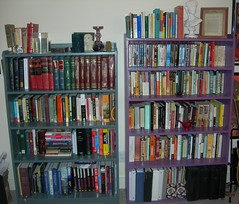by Craig Raine, 2006
202pp
Read: 1/19/07-1/28/07
I should start with the premise that T.S. Eliot is my absolute fave poet, ever. Perhaps I should've started with the premise that I am the kind of person to even have an absolute fave poet, ever, in this day and age.
In hindsight, I have absolutely no idea why I, at the age of 18, chose to do my AP English poetry presentation on Eliot. Nor can I recall the details of that project; I believe there was a clumsy analysis of "The Hippopotamus" and a surface-scratching ten page paper on The Wasteland. I didn't "get" the poetry then--either in sound or meaning--but I for some reason continued to adore the work of T.S. Eliot. I have no idea why. Over the next few years I read more Eliot, pretty much all of it. I wore out my cassettes with Ted Hughes reading Four Quartets--at one point broadcasting this and other poems over WREK for two hours. I read Joyce, and there got a whiff of the kind of serious literary analysis I'd need to conduct. I occasionally picked up, and put down, The Golden Bough. At one misguided point, I bloodied (my own) and tore my copy of The Wasteland: Facsimile and Transcript. A few weeks ago I was reading Selected Poems in the bathtub--it's something I do--when I was bitten by the Eliot bug all over again.
Fortuitously: I shortly thereafter read a glowing NYT review of this book, and pretty much immediately set out to buy it. I should probably tell you that I loved this book. But then, it may well be that I love reading all things Eliot.
This is not a good "first" Eliot book, if you're considering getting such a book for a young person in your life. Raine assumes you're familiar with Eliot's ouevre without bothering to catch you up to speed. When discussing particular poems, if you haven't committed them to memory, you ought to have Selected Poems at hand; Complete Poems and Plays would be handier; The Inventions of the March Hare comes into play at one point.
Not only does Raine assume his reader has already read Eliot, he assumes you've already read a bit *about* Eliot. He refers to, without really summarizing, criticisms of Eliot. He comments on poems that the average reader likely couldn't comprehend without reading someone's take on them.
But what Raine *does* have to say is pretty good. He looks out how two larger themes are explored throughout Eliot's work--one is reminded of the Joycean notion of artistic obsession--to wit: (1) "the buried life," a term Raine uses to mean both the passionate, artistic, adventurous lives most people avoid through hesitation; as well as the hidden emotions we each experience but cannot articulate or even really know; and (2) Eliot's "anti-Romantic" tendency, a rejection of bombastic emotion in poetry, in favor of an exploration of equally universal, if less artistically-explored, emotions. And he does a pretty good job of finding these themes in a variety of Eliot's poems; this approach succeeds with Eliot's shorter works, less so with the lengthier examinations of The Wasteland and Four Quartets. In fact, I'd go so far as to say that if you read the first two chapters--concerned with 12 or so shorter poems--you wouldn't be at too great a loss if you skipped the chapters on the longer poems, or the plays, or the criticism.
The book avoids biography as much as possible. Raine dismisses as unfounded speculation about Eliot's marriage, sexuality, attitudes toward Judaism, etc. as unfounded, and where there's genuine ambiguity Raine begins with the proposition that Eliot could do no wrong (which much endeared him to me).
Hey, remember seventh grade Language Arts? How before beginning a novel, your teacher would assign a vocab list drawn from words found in that novel with uncommon frequency? Should you read this book, you might find yourself looking up:
- topos
- bathos
- lexis
- zeugma
- expatiate
This book is part of Oxford University Press's "Lives and Legacies" series. Generally, I'm pretty leery about these series where a publisher decides "great writers writing about great writers (or thinkers) = $$$$$!!!" (other encounters with this format include David Foster Wallace writing about Cantor for Atlas/Norton's joint "Great Discoveries series;" William T. Vollman writing about Copernicus for same series; and Robert Pinksy writing about David for Shocken's "Jewish Encounters." Results vary.) The dust jacket to this book seems to sum up the compromises & limitations inherent to such series: "Brief, erudite, and inviting..." This book, at least, was too short to go into any serious academic discussion, but it was nevertheless written for a sophisticated audience (it's put out by the people who publish the OED, after all). The format does succeed, however, inasmuch as Raine's perspective as a poet do give him some pretty neat insights as to language, and he has a great command of the stable of authors one has to discuss when discussing Eliot.

1 comment:
Best poems of T.S. Elliot
Post a Comment